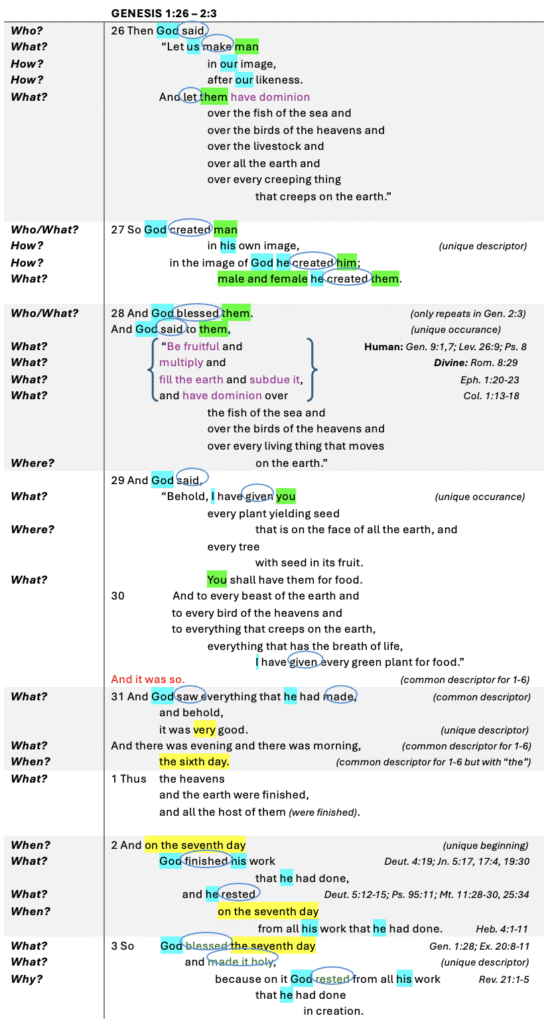Living Between Day 6 and Day 7
For the last 2 plus years I have been in a men’s Bible study led by a good friend of mine. Last year was a very special year since he was away and I was challenged to continue the group and our study of Romans. Meeting once a week, we were able to cover chapters 7-16 in a full year – I hope to share some of this later on. But now we have moved on (or back!) to a study of Genesis 1-11. I have spent a lot of time here over the years, but the method we use has generated a new layer of beauty and design in what God did in the 7-day creation account. It is a literal account and yet it is also much more than that. We can see here key themes and threads that weave their way throughout Scripture and through every day of our own lives.

The creation story reaches its climax not with stars or oceans, but with humanity. On the sixth day, God forms man and woman in His image and entrusts them with a holy vocation: “Be fruitful and multiply, fill the earth and subdue it, and have dominion” (Genesis 1:28). Humanity is created to mirror God’s character in the world—to work, create, and cultivate so that the goodness of God’s handiwork might flourish. Our continual and relentless search for meaning and the pursuit of spiritual, social, emotional and physical dominion is the evidence of God’s design and command to rule in His Name. Yet the story does not end with human achievement. It moves to a seventh day, when “God finished his work that he had done, and he rested” (Genesis 2:2). The rhythm of creation reveals a truth that shapes all of life: work is not complete until it finds its rest in God.
Throughout Scripture, this pattern of six and one becomes both a command and a promise. The Sabbath is first presented as a creation gift—a sign that the world is ordered for life with God, not endless striving. Later, it becomes a covenant sign for Israel: “For in six days the Lord made heaven and earth, and on the seventh day he rested and was refreshed” (Exodus 31:17). The Sabbath reminds God’s people that they are not slaves to production or performance; they are children of a Creator who Himself rests and delights in His work.
But human history shows that Day 6 never reached its goal. Adam’s sin fractured the partnership between human labor and divine rest. We build cities, gardens, and cultures, yet the curse of toil and frustration follows us. In a real sense, humanity has been living in the unfinished work of the sixth day—still striving to subdue the earth but unable to bring creation to completion. The prophets saw that what was needed was not merely a better work ethic, but a new creation.
That is why Christ’s words from the cross, “It is finished” (John 19:30), echo so profoundly through Scripture. The incarnate God completes the task humanity began but could not complete. His death on the sixth day of the week fulfills the labor that Adam and his descendants could not accomplish. His rest in the tomb sanctifies the seventh day, and His resurrection ushers in the dawn of a new creation. Hebrews 4 reminds believers that “there remains a Sabbath rest for the people of God,” not as one day in seven, but as a way of living within the finished work of Christ.

Living between Day 6 and Day 7 means learning to work and rest differently. Our work—whether teaching, leading, or caring for others—is no longer a desperate attempt to prove our worth. It becomes participation in God’s creative purpose. Our rest—whether weekly or eternal—is not mere recovery from exhaustion, but trust in the God who reigns and restores. When we cease striving long enough to remember that creation and redemption are His work, we taste the peace of the seventh day and glimpse the joy of the new creation still to come.
I’ve provided a structural outline of the text from the ESV as we use it for study … There are some key questions we can use to begin the process: It appears that the creation of man (Day 6) is the pinnacle of God’s creation. Why then is there a 7th day? What actually happens in Day 7? How is Day 7 unique in creation? How is Day 7 celebrated and discussed throughout the biblical narrative? Is there any meaningful way that mankind participates in Day 7?
Here are some follow up questions:
- What danger is there in “completing” our understanding of creation at Day 6?
- What kind of “rest” remains for God’s people (Heb. 4)?
- How is this rest connected to God’s own rest from creation?
- How does Christ’s work enable believers to enter that rest?
- How do the new creation and eternal kingdom fulfill the seventh day (Rev. 21)?
And I’ll provide you with a table for study as well…
| Theme | Day 6 | Day 7 |
| Human role | Work, stewardship, dominion, incompletion | Participation in God’s finished work |
| Divine role | Giver of identity, vocation and blessing | Completer, Sanctifier, Rest-Giver |
| O.T. Focus | Israel’s call to imitate God’s work and rest | God’s ongoing covenant rest and invitation to “enter” |
| Christ’s Fulfillment | “Finished the work” (Cross) | “Entered His rest” (Resurrection / New Creation) |
| Eternal Consummation | Human labor redeemed | Everlasting rest in God’s presence |
